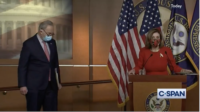With a new session about to start, lobbyists are focused on pending items, such as a bill to set up health-care plans for companies that belong to associations. Time is short. Congress wants to end legislative work before the Nov. 7 elections.
| Key Construction Measures Enacted in 2005 | ||
|
Bill (Date Enacted) Summary | SUMMARY | |
| SAFETEA-LU (Aug. 10) | Authorizes record $244 billion over five yearsfor highways and mass transit. | |
| Energy Policy (Aug. 8) | Electricity reliability standards, nuclearpower incentives, provisions to speed transmission grid building. | |
| Hurricane Relief/DOD Appropriations (Dec. 30) | Has $29 billion in disaster relief aid. Provision to permit oil drilling in Alaska wildlife refuge deleted. | |
| Terrorism Insurance (Dec. 22) | 2-year extension of federal backstop carriesprogram through Dec. 31, 2007. Insurers to assume more costs. | |
| Gulf Opportunity Zone Act $8.7 billion in tax breaks over 10 (Dec. 21) | $8.7 billion in tax breaks over 10 years, inlcudes bonus depreciation for new Gulf Coast structures. | |
| Sources: White House, Appropriations Committees, Senate Banking Committee, Joint Committee on Taxation, ENR | ||
For 2005, the highlight was the August signing of the Safe, Accountable, Flexible, Efficient Transportation Equity Act: A Legacy for Users, which authorizes $244 billion over five years. Casey Dinges, American Society of Civil Engineers managing director for external affairs, says SAFETEA-LU was certainly historic...but in terms of meeting the nations need, it fell short. Legislators also took their time: It was enacted 22 months after the preceding law ran out.
An extension of the federal backstop for terrorism-related insurance was welcomed. Final negotiations didnt occur until a Dec. 31 program cutoff loomed. But Bill Spencer, Associated Builders & Contractors vice president for government affairs, says, They got it done pretty quickly at the end.
Lawmakers kept the Gulf Coast on edge about reconstruction funds, which were tied to a Dept. of Defense bill. The hangup was a fight over opening the Arctic National Wildlife Refuge to oil drilling.
ANWR foes narrowly prevailed in the Senate and the drilling language was dropped. That cleared the way for the DOD bill and hurricane relief aid, including $2.9 billion for levees and $2.75 billion for roads in the Gulf and other areas.
| Several utilities have said theyre interested in applying for licenses to build new reactors, says Jim Dyer, director of NRCs office of nuclear reactor regulation. He says that when the AP1000 rule is published, a utility can apply to construct a plant using the design. Westinghouse says the AP1000 is the first of a new generation of reactor designs to achieve certification. NRC gave final approval to the companys design in 2004. The proposed benchmarks, announced Dec. 20, apply to particles of 2.5 micrometers or less. EPA would retain the current annual limit of 15 micrograms per cubic meter of air. But it would cut daily limits to 35 micrograms, from 65 micrograms now. Last June, EPAs Clean Air Scientific Advisory Committee called for trimming the daily limit to 30 to 35 micrograms and the annual limit to 13 to 14 micrograms. EPA estimates that 191 coun-ties would violate the new rule if it were to take effect, up from 116 counties now in the nonattainment category.
|


Post a comment to this article
Report Abusive Comment